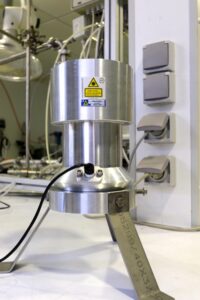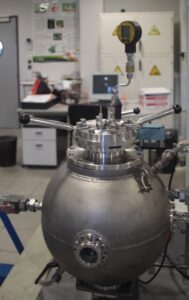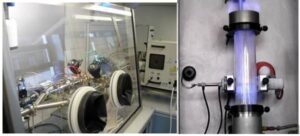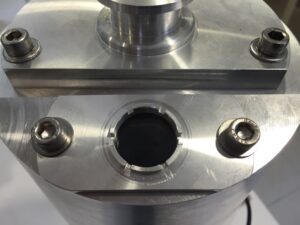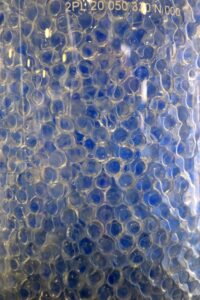PErSeVAL
Processus pour l'environnement, la sécurité et la valorisation des ressources
Global industrial expansion, while undeniably a source of improved living conditions, is also a source of risks to the safety of people and property, and to the integrity of the environment. At the same time, for more than half a century, the combination of population growth and increased consumption has posed threats to humanity, particularly in terms of ecosystem degradation, climate change and the depletion of natural resources.
Improving the quality of the environment (air, water, soil), making rational use of resources and controlling industrial risks have therefore become fundamental challenges for a sustainable economy and development. As an integrative science, processes contribute to meeting these challenges.
Within the Perseval axis, three themes (Aerosol filtration - Explosion safety, Hydro-metallurgical processes: from design to optimization, and Processes for water and electrical energy) work together to meet these scientific challenges, by :
- developing innovative processes for treating effluents (gases, aerosols, liquids) and pollution (soil),
by proposing intrinsically cleaner and safer processes, notably through multi-scale approaches, - contribute to the rational management of resources, by valorizing secondary resources that are little or not exploited (hydrometallurgy, methanization, waste valorization, etc.)
- drawing on the concept of circular engineering
design and/or optimize processes for the use and production of renewable energies (electrochemical energy conversion processes, low-carbon mobility, etc.). - develop environmental process analysis tools for impact and risk assessment.
SAFE: Safety Aerosol Filtration Explosion
The SAFE team shares a common vision and purpose: to develop expertise in the field of risk prevention in order to offer intrinsically cleaner and safer processes. Three areas in particular are addressed with a view to understanding phenomena, modeling, simulation and process optimization:
- gas/particle separation,
- adsorption,
- dust explosion.
The SAFE team is equipped with three specific technological platforms for the study of i) aerosols and their filtration, ii) adsorbents and adsorption dynamics, iii) ignition/explosion of powders and gas/dust mixtures. In addition to the experimental approach, numerical simulations are carried out to propose predictive approaches. Finally, she collaborates with INRS as part of the joint LFA laboratory (Laboratoire Filtration et Adsorption) and IRSN as part of LIMA (Laboratoire sur les Interactions Médias Aérosol).
Skills
- Physique et métrologie des aérosols (micro / nano) US
- Filtration (milieu poreux) US
- Séparation gaz/particules (colonnes à bulles, lits granulaires…) US
Equipments
Plateforme Aérosols US
The LRGP has an extensive range of analytical equipment (SEM, BET, mercury porosimeter, PIV, granulometers, helium pycnometer, etc.). In addition to this standard equipment common to all research groups, the SAFE team has equipment specific to the aerosol field: micron and submicron aerosol generators (solid or liquid), particle counters (from 3 nm to 40 µm), electrometers, charge neutralizers, etc.
Plateforme Sécurité US
SAFE is equipped to measure the parameters needed to assess the risks associated with the ignition and explosion of dusts and hybrid gas-vapor-powder mixtures.
- Measurement of minimum ignition temperature (MIT) and self-ignition temperature (SIT)
- Measurement of minimum ignition energy (MIE) and minimum explosive concentration (MEC)
- Flammability limits (LI)
- Measurement of explosion severity (Pmax, dP/dtmax, Kst and St class)
- Static electricity
HydroMetallurgical Processes: from Design to Optimization
The growing use of metals for strategic applications such as those linked to the energy transition or electric mobility is leading to problems of supply and criticality for some of them. The need to exploit poorer ores and secondary resources is leading to scientific challenges that our team seeks to address by designing, implementing and optimizing hydrometallurgical processes, with expertise in a range of separation processes such as precipitation, ion exchange, nanofiltration and electrodialysis. Speciation plays a key role in all these unit operations, and methodologies have been developed to take it into account. Recovered metals come from a variety of secondary resources. Agromine is one of the team's areas of expertise. The recovery of metals from soils using hyperaccumulative plants enables phytoremediation as well as valorization of these biosourced metals. Urban mining is another resource, with the development of recycling processes (batteries, WEEE, catalysts, etc.). The environmental impact of these processes is assessed using Life Cycle Assessment (LCA). The team also has expertise in modeling, simulation and optimization of these processes.
Processes for Water and Power
The team focuses on two main themes:
- Processes for treating urban and industrial wastewater and natural water, as well as for recycling and resource recovery,
- Electrical energy conversion processes for peri-urban transport, combining production and storage.
The study of these themes draws on expertise in four methodological fields:
- Metrological aspects for the acquisition of physical data (velocity field, temperature, pressure, potential), physico-chemical data (pH, redox, conductivity, concentrations), or biological data (biomass, ATP, metagenomics). These data are interpreted by modeling flow phenomena, transfers and chemical, biological and electrochemical reaction kinetics to understand, for example, the dissemination of pollutants and micropollutants, or the power distribution of a hybrid source.
- Study of multiphase phenomena: hydrodynamics, transfers of matter, heat and electrical charges to an interface (bubbles, drops, living cells or electrodes) with possible coupling of reaction kinetics, with a multi-scale approach.
- Innovative process design, such as for the development of nature-based water purification solutions (e.g. Vegetated Discharge Zones).
- Environmental assessment of processes using Life Cycle Assessment (LCA).
The team has a wide range of equipment adapted to its experimental needs, both at laboratory level and on technology platforms such as HyMob for hydrogen electric mobility at the Nancy Faculty of Science and Technology. In addition, P3E's research work is often carried out in collaboration with other laboratories such as LCPME, IJL, CRAN, GREEN or the Zone Atelier Moselle, ZAM.
Members
Nouceiba ADOUANI, Maître de Conférences
Tima AL HAFFAR, Doctorant
Jean-Christophe APPERT-COLLIN, Maître de Conférences
Soukayna BADRE-EDDINE, Doctorant
Roberto BARBANO, Doctorant
Caroline BONNET, Maître de Conférences
Elise CABASET, Doctorant
Jean-Claude CHARPENTIER, Directeur de recherche Emérite
Augustin CHARVET, Maître de Conférences
Rémi DEMOL, Maître de Conférences
Saad DIRIS, Doctorant
Olivier DUFAUD, Professeur des universités
Yingjie FEI, Doctorant
Miguel Angel FLOREZ PRIETO, Doctorant
Ludivine FRANCK-LACAZE, Maître de Conférences
Ludivine FRANCK-LACAZE, Maître de Conférences
Melika HINAJE, Professeur des universités
Lilian KARCHER, Doctorant
Olivier KESTER, Doctorant
Mtoilibou Abdallah KEYMOON, Doctorant
Francois LAPICQUE, Directeur de recherche Emérite
Abderrazak LATIFI, Professeur des universités
Abderrazak LATIFI, Professeur des universités
Baptiste LAUBIE, Maître de Conférences
Yohann LE GUENNEC, Chercheur
François LESAGE, Maître de Conférences
François LESAGE, Maître de Conférences
Huai Zhi LI, Professeur des universités
Alexis LOUIS, Technicien
Nathalie MONNIER, Maître de Conférences
Thomas MONOT, Chercheur
Hervé MUHR, Directeur de recherche CNRS
Laurence MUHR, Professeur des universités
Stephanie PACAULT, Assistant ingénieur
Laurent PERRIN, Professeur des universités
Clémence PINCHAUX, Doctorant
Marie-Noelle PONS, Directeur de recherche Emérite
Steve PONTVIANNE, Assistant ingénieur
Olivier POTIER, Maître de Conférences
Lorena Eugenia RAMIREZ VELAZQUEZ, Doctorant
Olivier RASTOIX, Doctorant
Adrien RIZZA, Doctorant
Michel SARDIN, Professeur Emérite
Jose de Jesus SERRANO HERNANDEZ, Doctorant
Léa SIGOT, Maître de Conférences
Marie-Odile SIMONNOT, Professeur des universités
Samuel TEILLAUD, Chercheur
Dominique THOMAS, Professeur des universités
Cécile VALLIERES, Professeur des universités
Jozef VARGAN, Doctorant
Jozef VARGAN, Doctorant
Victor VASTRA - CASTEL, Doctorant
David VAURIS, Doctorant
Mengxi WEN, Doctorant
Abas WOUPNDOUNOU, CDD - Ingénieur d'études (catégorie A)
Abas WOUPNDOUNOU, CDD - Ingénieur d'études (catégorie A)
Wen XUAN, Chercheur
Wen XUAN, Chercheur
